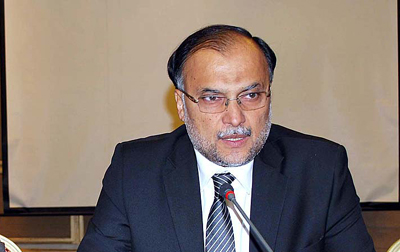ISLAMABAD
Minister for Planning Ahsan Iqbal has asked the Federal Board of Revenue (FBR) to urgently finalise its plans for modernising documentation systems, improving monitoring and implementation as well as effectively measuring the evaluation and assessment mechanism under the China Pakistan Economic Corridor (CPEC).
He issued these instructions while addressing a Business and Research Seminar on China Pakistan Economic Corridor organized by Directorate of Training and Research (Customs), held here on Friday.
Planning, Development & Reform Secretary, Shoaib Ahmad Siddiqui was also present on the occasion while Project Director CPEC, Hassan Daud Butt briefed the participants regarding CPEC projects.
The minister noted that customs has to play a crucial role in CPEC to facilitate effective channels for engaging Pakistan in global supply chain and assist in developing Pakistan’s market oriented economy and industries.
He said that Pakistan needs to synergise with fast industrialisation process and innovations in technologies to ensure rapid growth and inclusive development in the country. “CPEC has provided an opportunity to promote new markets and connectivity across the entire region and there is the need for further cooperation”, he said.
The minister said that historically all countries progressed by virtue of partnerships. “Japan and South Korea had developed due to USA and India progressed due to alliance first with USSR and now the USA. Days of non-alignment are over,” he added.
Iqbal said that Pakistan was lucky to have a time tested relationship with China and CPEC has transformed this bilateral relation from strategic into economic nature. CPEC is the fastest developing corridor in the entire belt and road initiative and a number of its early harvest projects are attaining completion.
Pakistan has completed Sahiwal coal-fired critical technology plant in record time, setting a precedent that together, Pakistan and China can do wonders. Today is the age of discovery, innovation and speed wherein old concepts, as well as paradigms, have become redundant. In past, big used to eat small but now, fast eats the slow. Every nation state has to adapt to new ways and technology, he said.
Iqbal said that investment, industries, information and individuals were crucial for development of any country, now beyond control of nation states. “Every country has to attract global investment and make country, an attractive investment destination. Security, stability of policies and sustainable growth paves way for ensuring an attractive investment destination”.
Iqbal said that the world is at the tip of 4th Industrial revolution; an age of big data, cloud computing and robotics where basic economics have to redefine their ways.
“We might be victims if we don’t embrace change” he remarked, adding that there can be three responses to such changes; either embrace change proactively by developing ‘our’ capacity and becoming competitive, wake up when the change happens and make compromise with the change or ignore the change and get wiped off the scene forever.
“We need to ensure stability, social solidarity, internal harmony, reforms, improve and align ourselves with international happening. Otherwise our ship will sink” Ahsan Iqbal observed.
Iqbal said that we have seized the moment where 85 million labour intensive jobs in China are to be relocated. “Otherwise the opportunities will go to Laos, Cambodia and other parts of world,” he said, adding that our industrialisation should be robust and competitive in order to completely capitalise on this geo-economic mega regional initiative.




